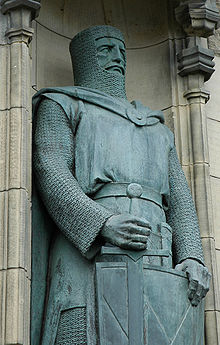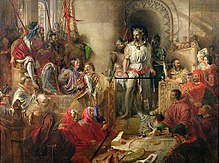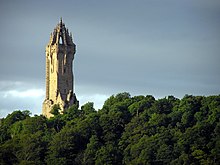William Wallace
Appearance

Sir William Wallace (c. 1270 – 23 August 1305) was the Guardian of Scotland and resistance leader during the Wars of Scottish Independence. This page is for actual quotations of or about Wallace; for quotations from the 1995 film based upon his life and legends, see Braveheart.
- For other uses, see William Wallace (disambiguation).
Quotes
[edit]

- We come here with no peaceful intent, but ready for battle, determined to avenge our wrongs and set our country free. Let your masters come and attack us: we are ready to meet them beard to beard.
- Statement before the Battle of Stirling Bridge (11 September 1297), as quoted in History of Scotland (1841) by Patrick Fraser Tytler, p. 121
- I have brought you to the ring, now dance if you can.
- Statement before the Battle of Falkirk (21 July 1298); as quoted in The Story of England (1909) by Samuel B. Harding
- Variants: I hae brocht ye to the ring, now see gif ye can dance.
I have brought you to the ring, now see if you can dance.
I have brought you to the ring. Dance if ye can.
I have brought you to the Revel, Now dance if you can.
- I can not be a traitor, for I owe him no allegiance. He is not my Sovereign; he never received my homage; and whilst life is in this persecuted body, he never shall receive it. To the other points whereof I am accused, I freely confess them all. As Governor of my country I have been an enemy to its enemies; I have slain the English; I have mortally opposed the English King; I have stormed and taken the towns and castles which he unjustly claimed as his own. If I or my soldiers have plundered or done injury to the houses or ministers of religion, I repent me of my sin; but it is not of Edward of England I shall ask pardon.
- Statement at his trial, rejecting the assertion he was a traitor to Edward I of England (23 August 1305), as quoted in Lives of Scottish Worthies (1831) by Patrick Fraser Tytler, p. 279
- Variant: I could not be a traitor to Edward, for I was never his subject.
- Dico Tibi Verum, Libertas Optima Rerum: Nunquam Servili Sub Nexu Vivito, Fili
Quotes about Wallace
[edit]
So good of hand again shall ne'er be kenned.

- For sooth, ere he decease,
Shall many thousands in the field make end.
From Scotland he shall forth the Southron send,
And Scotland thrice he shall bring to peace.
So good of hand again shall ne'er be kenned.
- First, here I honour, in particular,
Sir William Wallace, much renown'd in war,
Whose bold progenitors have long time stood,
Of honourable and true Scottish blood.- Wallace by Blind Harry (c. 1460) as translated by William of Gilbertfield The Life and Heroic Actions of the Renoun'd Sir William Wallace, General and Governor of Scotland (1722).
- The whole followers of the nobility had attached themselves to him; and that although the persons of their lords were with the King of England, their heart was with Wallace, who found his army reinforced by so immense a multitude of the Scots, that the community of the land obeyed him as their leader and their prince.
- Henry Knighton as quoted in History of Scotland (1841) by Patrick Fraser Tytler, p. 117.
- Every man dies. Not every man really lives.
- Promotional phrase for the movie Braveheart, written by poet William Ross Wallace (1819-1891).
- For, here he has rotted in his lonely grave,
Shall so many nobles will cheer for his death and partake in wine and alcohol.
He did not forth troops to England nor did he surrender to the French,
And Scotland he will not ever bring to peace nor free Scotland from the English chain.
So he will not encourage others for he is truly dead.- Torquil Fingall as quoted in the History of Folk Songs.


